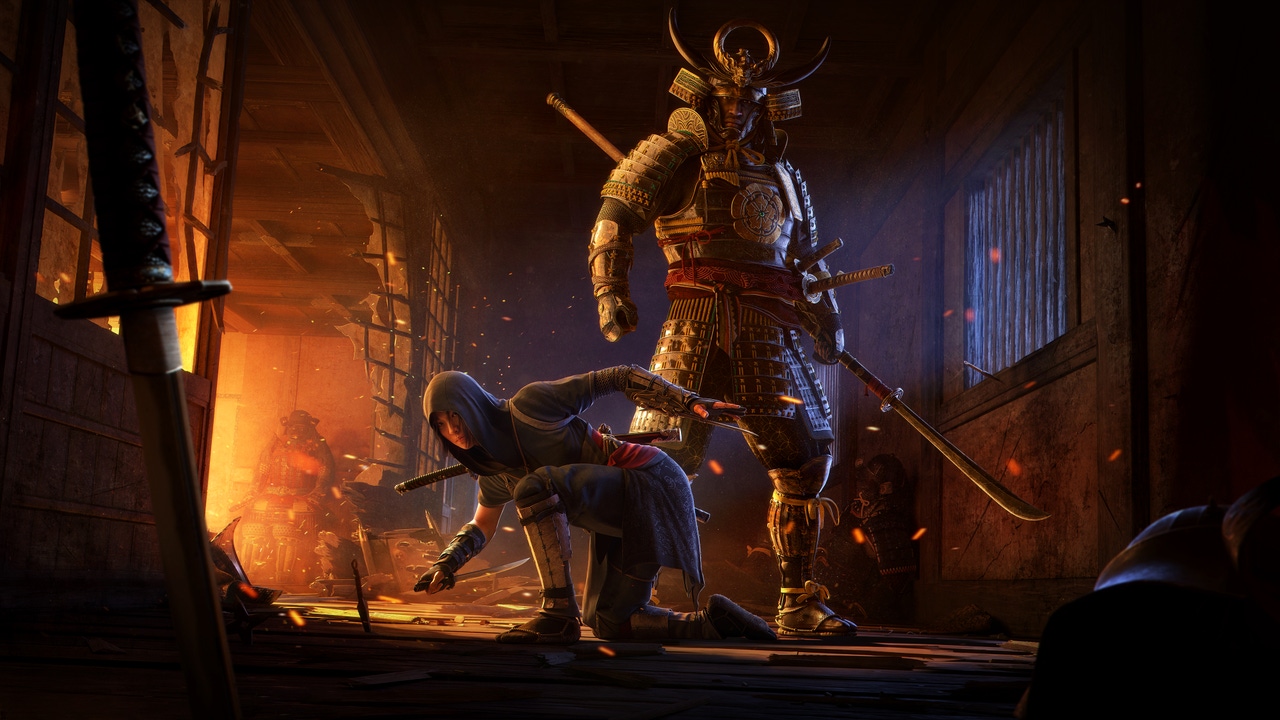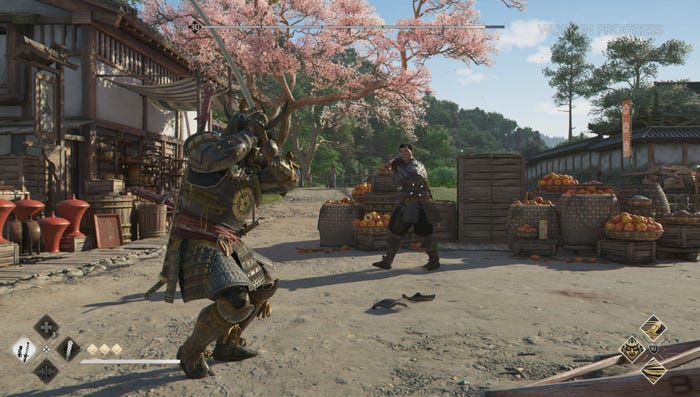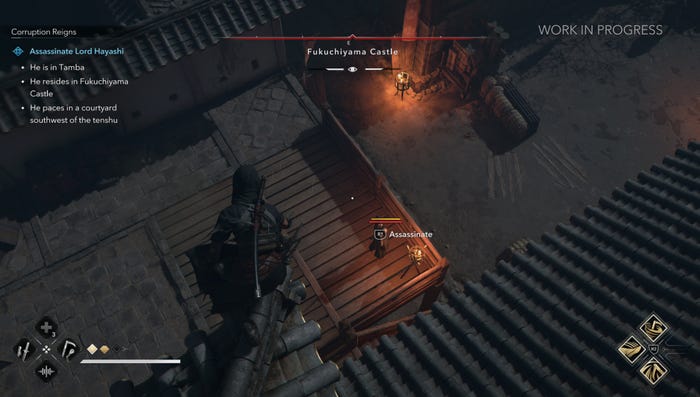Trending
Opinion: How will Project 2025 impact game developers?
The Heritage Foundation's manifesto for the possible next administration could do great harm to many, including large portions of the game development community.
Ubisoft Quebec has wrangled with dynamic duos before.

One of the main hooks of the Assassin's Creed series is seeing an action-adventure game set in historical eras not often seen in game development. Whether exploring cathedrals and canals in Renaissance-era Venice or colonial cities in North America during the 18th century, Ubisoft's flagship franchise has been creative with recontextualizing history. But when it comes to making an entry set in an era often explored for games, the next Assassin's Creed aims to approach it from different angles to showcase its next setting and protagonists in a new light.
With Assassin's Creed Shadows, developer Ubisoft Quebec leans into the studio's prior experience on AC Syndicate and Odyssey to make a game with dual protagonists who can engage with the setting and its characters very differently. Focusing on the story of the African foreigner turned samurai Yasuke and the female shinobi Naoe coming into her own, they each offer a unique perspective on contending with wartime Feudal Japan.
At the Ubisoft Forward 2024 showcase, we spoke with associate game director Simon Lemay-Comtois about how the developers leaned further into building an open world around two protagonists that are polar opposites of one another.
According to Lemay-Comtois, realizing the long-requested Feudal-era Japan setting was about "pushing forward with that shinobi fantasy," which aligns with the series' focus on elusive assassins in historical settings. Yet, with Assassin's Creed Shadows, it was imperative for the dev team to not only make an AC game with ninjas and samurai, but to deliver a well-rounded experience that centred the very different perspectives of two unique protagonists.
"Syndicate was our first time helming a core AC game, and at the time, we were very ambitious with what we wanted to do," said Lemay-Comtois. "But of course, we were young and didn't go all in as we could have with that game. Now that we're a more mature studio with experience handling games like this, we trust ourselves with AC and push much further with the contrast between the dual protagonists and their experiences. One is an African male and a foreigner in a new land, and the other is a Japanese female trying to find her place during an era where women had a very different experience. So we're leaning into these real cultural tenets, pushing as far as we can in ways we couldn't on Syndicate."

Image via Ubisoft.
In Assassin's Creed Shadows, the story takes place during the end of the Sengoku period in the 16th century, with Yasuke and Naoe–both outsiders in their own ways–joining forces to navigate the complex hierarchies of power during a civil war in Japan. There are, of course, larger and more sinister forces to contend with that lean into AC's blend of historical fiction and sci-fi fantasy. Much like Ubisoft Quebec's work on Syndicate, the twin protagonist approach offers two contrasting narratives that comprise a larger whole and showcase parallel gameplay styles–with Yasuke focusing on combat and fighting in the open, and Naoe relying on stealth action that has some influence from Splinter Cell's light-and-shadow gameplay.
In many ways, each character and their respective gameplay styles reflect the two core pillars of the AC series: combat and stealth. While Shadows still retains AC's recent trend towards RPG mechanics like leveling up and earning gear, the core combat and stealth focuses more on the action and timing-oriented gameplay from earlier games. Players can choose which characters to take on specific missions and leverage their individual playstyle to overcome obstacles (and do murder) in unique ways. It's a notable change given how combat-heavy recent games in the series have become.
Our demo saw the same mission being played with each character, offering a glimpse at how choosing either Yasuke or Naoe will fundamentally alter the flow and dynamics of missions. In one pivotal moment in Yasuke's mission, he tore through the walls of the lord's sanctum to access his target. Naoe, by contrast, carefully grappled onto roofs and crawled prone-style through a pond out of sight to land a stealth kill. That duality makes for a refreshing change of pace for the franchise.
While Ancient Japan and the mythology of the samurai and ninja have been common conceits within games like Sekiro: Shadows Die Twice and Ghost of Tsushima, the developers of Assassin’s Creed Shadows wanted to take an opportunity to shine a particular spotlight on details and figures not often represented from the era.
Lemay-Comtois says the historical figure of Yasuke and how he navigated Japanese society during the era was something the dev team stumbled upon during their research. This not only helped them gain a greater understanding of how to best reflect Japan's history and culture through the lens of Assasin’s Creed, it also made the developers acknowledge their own outsider's perspective while pursuing a sense of authenticity for the setting.
"One of the opportunities it gave us was to be humble about the culture of Japan, because it's not ours–we're a Canadian studio leading this game, so we know we're not of Japan, and we certainly don't want to tell Japanese audiences what their culture is all about," said Lemay-Comtois. "We want to respect the setting and era and put it forward for AC, and having Yasuke as one of the main characters with an outsider's point of view was a way for us to have some creative leeway in crafting this story from different angles. But also having Naoe as the other protagonist, who is Japanese-born and of the culture, allowed us to have that needed counterbalance for the Japanese perspective to bring it all together."

Image via Ubisoft.
Unfortunately, Assassin’s Creed Shadows has drawn the ire of certain online communities, which have expressed outrage at the choice of a Black protagonist in a Japanese setting. Lemay-Comtois said he and his team weren't fazed by the racist backlash, and that picking two underrepresented protagonists from Japanese history was in the spirit of the game.
So far, Shadows is taking an intelligent approach to building one of the series' most requested settings, while also seizing the opportunity to resolve a recurring issue that has seen modern Assassin's Creed gameplay become inconsistent with combat and stealth. Protagonists Yasuke and Naoe offer unique ways to content with and navigate the rich setting, and make for compelling additions to the long-running series.
You May Also Like